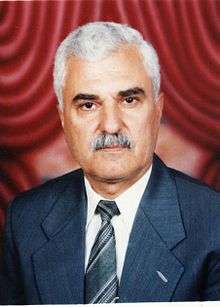George Sabra
George Sabra (Arabic: جورج صبرة, born 11 July 1947) is a member of the Syrian Democratic People's Party. He was elected president of the Syrian National Council, the main opposition group in Syria, on 9 November 2012 and later was acting president of the National Coalition for Syrian Revolutionary and Opposition Forces from 22 April[1] – 6 July 2013. He resigned from the National Coalition on 25 April 2018.[2] Sabra is a Christian.[3]
George Sabra جورج صبرة | |
|---|---|
 | |
| President of the National Coalition for Syrian Revolutionary and Opposition Forces Acting | |
| In office 22 April 2013 – 6 July 2013 | |
| Prime Minister | Ghassan Hitto |
| Preceded by | Moaz al-Khatib |
| Succeeded by | Ahmad al-Jarba |
| Personal details | |
| Born | 11 July 1947 Qatana, Syria |
| Alma mater | Damascus University Indiana University, Bloomington |
Early life and education
Sabra was born to a Christian family in the city of Qatana in Rif Dimashq Governorate on 11 July 1947.[4] He graduated with a geography degree from Damascus University in 1971 and a degree in educational technology systems from Indiana University in 1978.[5] He since became a geography teacher, as well as a screenwriter. He is one of the writers for the Arabic version, Iftah Ya Simsim, of the children's show Sesame Street.[6]
Political career
Sabra has been politically active in the Syrian opposition movement since the 1970s. He joined the Syrian Communist Party (Political Bureau) in 1970 and was elected to its Central Committee in 1985. He was arrested in 1987 during one of many government crackdowns on the party and imprisoned for eight years. A few years after his release, in 2000, he was assigned to represent his party in the National Democratic Rally, a coalition of leftist parties that was originally formed in 1979, and he was subsequently elected to the rally's Central Committee.[5] After the death of President Hafez al-Assad, his son, Bashar al-Assad allowed a brief toleration of opposition that was known as the Damascus Spring. Sabra was one of 250 people who signed the Damascus Declaration in 2005, which called for peaceful reform in Syria. [7]
Sabra was arrested on 10 April 2011 [8] He was arrested again on 20 July 2011 and was released two months later, having been held incommunicado.[9] He left Syria in January 2012 to join the Paris-based Syrian National Council. [10] Almost immediately he unsuccessfully challenged Burhan Ghalioun for the leadership of the SNC.[11] He stood again in April, when he received 11 out of 40 votes against Ghalioun's 21 votes. [12]
On 22 April 2013, president of the National Coalition for Syrian Revolutionary and Opposition Forces, Moaz al-Khatib resigned in protest of the lack of international aid to the Syrian opposition by the Friends of Syria Group. George Sabra was then appointed as Khatib's successor.[13]
On 25 April 2018, George Sabra, along with former SNC vice president Suheir Atassi and president Khaled Khoja, resigned from the Syrian National Coalition. Sabra said that the SNC is "no longer devoted to the principles of the revolution and the goals of the [Syrian] people".[2]
References
- "Syrian National Council chooses George Sabra as leader". BBC News. 9 November 2012. Retrieved 10 November 2012.
- "Three Syria opposition coalition members resign over 'Russian control of peace talks'". Al-Araby Al-Jadeed. 25 April 2018.
- "Syria: Deraa bombings 'kill soldiers'". BBC News. 10 November 2012. Retrieved 10 November 2012.
- "Syrian opposition head wants no-strings aid". Al Jazeera. 11 November 2012. Retrieved 11 November 2012.
- "George Sabra". Carnegie Middle East Center. Retrieved 11 November 2012.
- Hammond, Andrew (9 November 2012). "Syria's opposition SNC elects George Sabra as new head". Reuters. Retrieved 11 November 2012.
- Divided Syrian opposition unites to call for change, Lebanon Wire, 17 October 2005
- Speech by George Sabra, translated by Iyad El-Baghdadi, George Sabra, 8 February 2012
- Syria: Further information: George Sabra released, Amnesty International, 22 September 2011
- Opposition Leader Leaves Syria for France, Calls for U.N. Help, Naharnet, 24 January 2012
- Syrian National Council to Choose Leader Wednesday in Doha, Naharnet, 14 February 2012
- Ghalioun Elected Chief of Syrian Opposition Coalition, Naharnet, 15 May 2012
- Syria opposition names interim leader, www.aljazeera.com, retrieved: April 23, 2013
External links
| Political offices | ||
|---|---|---|
| Preceded by Moaz al-Khatib |
President of the National Coalition for Syrian Revolutionary and Opposition Forces Acting 2013 |
Succeeded by Ahmad Jarba |